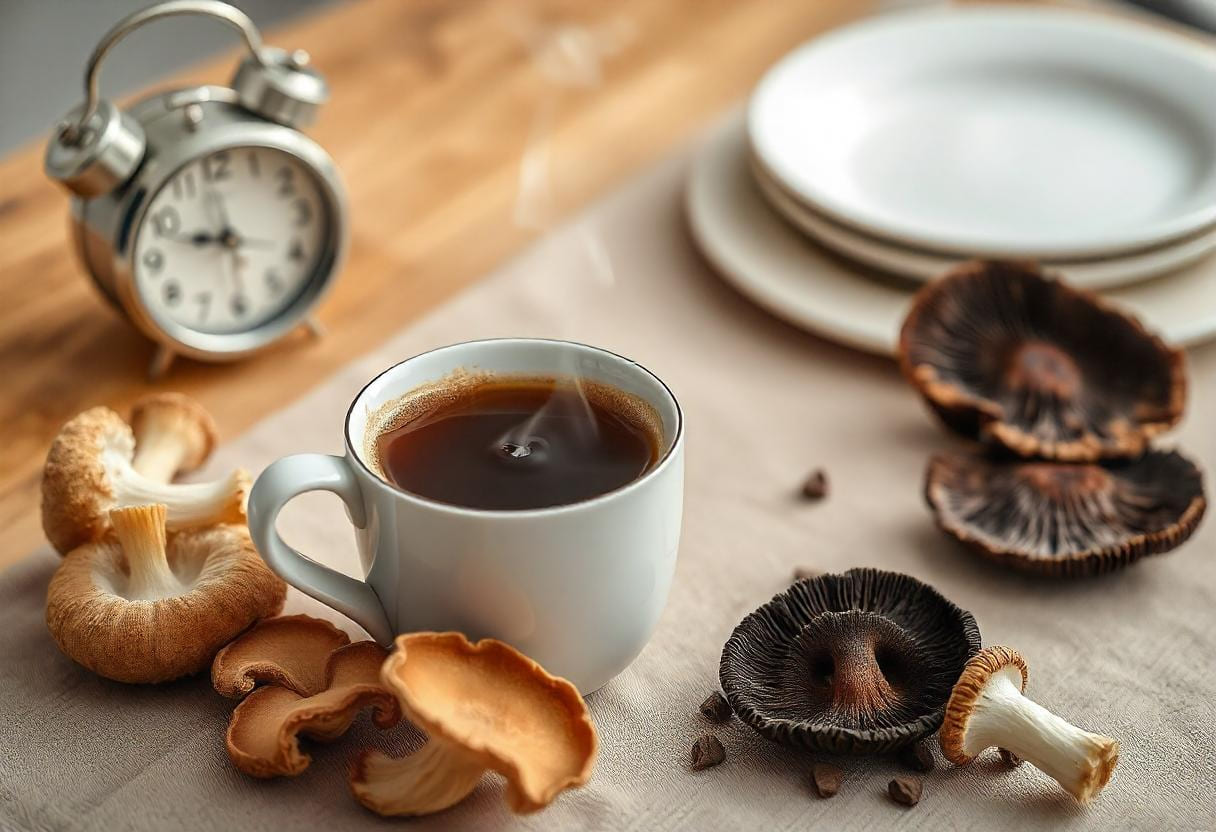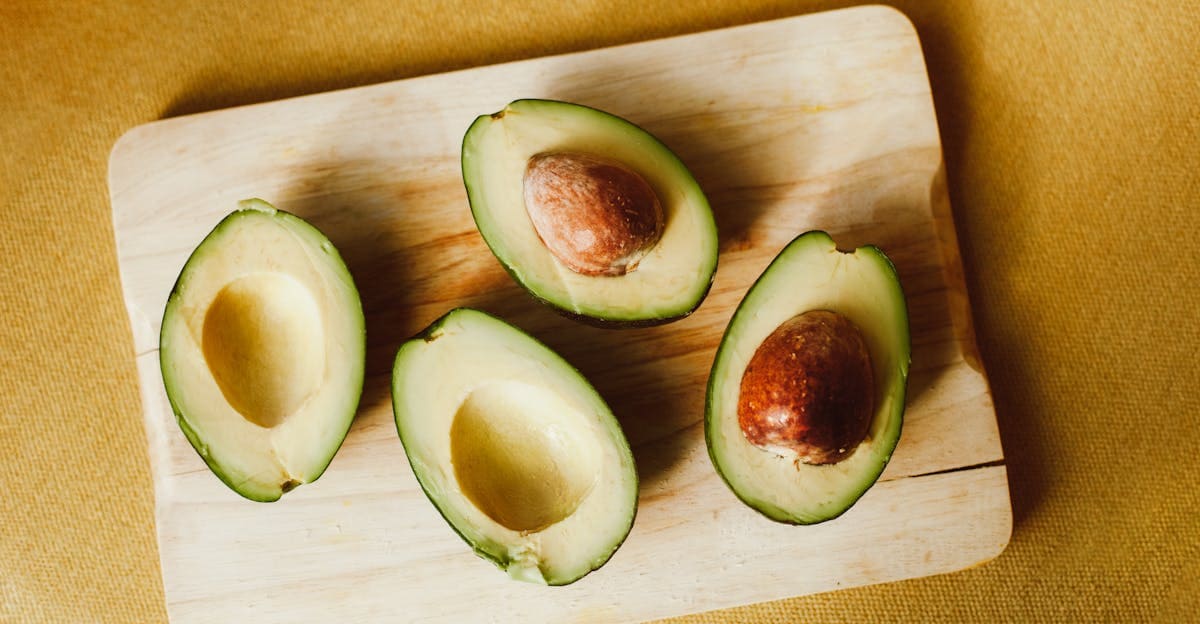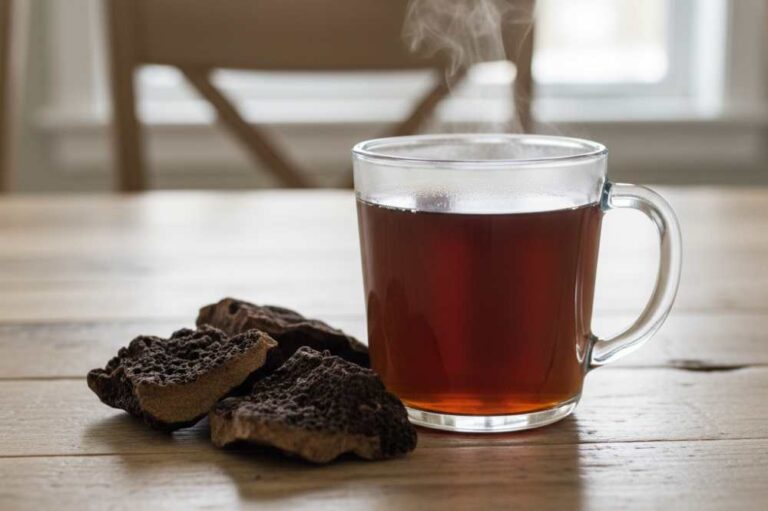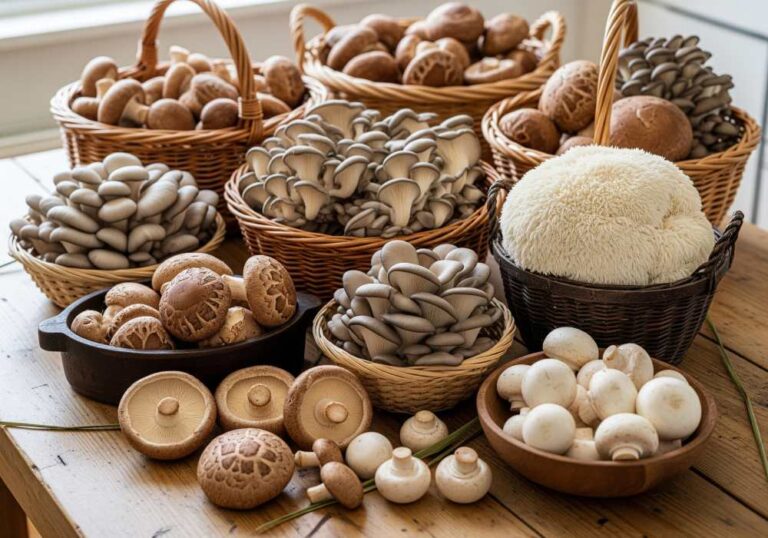Fasting has become a popular health trend, with millions embracing it for benefits like weight loss, mental clarity, and improved metabolism. But the question of what you can or cannot consume during fasting often sparks curiosity.
With its low-calorie profile and potential health perks, mushroom coffee is a fasting-friendly beverage.
But does it truly align with the principles of fasting?
In this article, we’ll explore the connection between mushroom coffee and fasting to help you understand whether it’s a smart addition to your routine.
Can You Drink Mushroom Coffee While Fasting?
The short answer is yes, you can drink mushroom coffee while fasting—but it depends on how you prepare it.

If consumed plain, mushroom coffee is low in calories, contains no carbs, fats, or proteins, and won’t break a fast. However, adding sugar, cream, or milk can disrupt the fasting state.
So, if you aim to stay fast while enjoying a warm beverage, plain mushroom coffee is a safe and beneficial option. On the other hand, if you add calorie-heavy ingredients, it transitions from a fasting-friendly drink to a regular meal complement.
Understanding of mushroom Coffee and Fasting
It’s a blend of coffee beans and mushroom extracts, usually from functional mushrooms like Lion’s Mane, Chaga, or Reishi. These mushrooms are known for their adaptogenic properties, which help the body manage stress, boost focus, and improve well-being.
Lion’s Mane, for example, is believed to promote the growth of good bacteria in your gut, which also can help people with IBS symptoms. The low FODMAP content makes it an even better option for the fasting folks.

From a nutritional standpoint, mushroom coffee typically contains minimal calories. The blend usually has less caffeine than regular coffee, which reduces the risk of jitters while providing a smoother energy lift.
Mushroom coffee doesn’t typically contain sugars or fats, so it has a low impact on blood sugar levels. This makes it appealing to those who fast.
Intermittent Fasting
Fasting is the practice of voluntarily avoiding food and, sometimes, beverages for a specific period. It is often done for health, religious, or cultural reasons.
Intermittent fasting is a structured eating pattern where you cycle between periods of eating and fasting. It doesn’t focus on what you eat but on when you eat.

There are several popular methods of intermittent fasting:
16/8 Method
This method requires fasting for 16 hours and limiting your eating to an 8-hour window. It is usually from noon to 8 PM. It’s one of the most popular and sustainable fasting schedules because it aligns with a typical day and allows for a daily meal routine.
5:2 Method
In this approach, you usually eat five days a week, while on the other two days, you significantly reduce your calorie intake (usually around 500-600 calories). The fasting days are typically spread out, such as fasting on Mondays and Thursdays.
Alternate-Day Fasting
In this method, you fast every other day, either by consuming no calories or having a very low-calorie intake on fasting days. On non-fasting days, you can eat normally. While effective for some, it can be more challenging to maintain long-term.

Eat-Stop-Eat
This approach includes a full 24-hour fast once or twice a week. For example, if you finish dinner at 7 PM, you would eat again at 7 PM the next day. This method can be intense but effective for those who prefer occasional, extended fasts.

Warrior Diet
Here you can have small amounts of raw fruits and vegetables during a 20-hour fasting window, followed by a large meal in the evening. It’s designed to mimic the eating patterns of ancient warriors and is ideal for those who prefer eating once a day.

Water Fasting
Consuming only water for an extended period, with no food or other beverages, is Water Fasting. Consuming Mushroom coffee during that period would break the fast.
How does fasting benefit us?
During fasting, the body goes through several stages. Initially, it uses glucose (sugar) from recent meals for energy. After about 12 hours, when glucose levels deplete, the body switches to burning stored fat, a state called ketosis. This fat-burning process is where many of the benefits of fasting occur, such as weight loss, improved insulin sensitivity, and enhanced mental clarity.

The Rule of breaking a fast
A standard guideline for breaking a fast is that consuming more than 1 gram of carbs, proteins, or fats can trigger a metabolic response, effectively breaking the fast. This rule helps maintain the state of ketosis, autophagy, and fat-burning.
Regarding mushroom coffee, most plain versions contain minimal calories and usually fall below this 1-gram threshold. The key is avoiding adding extra cream, sugar, or flavoured syrups, which can exceed this limit and break your fast.
Stick to black mushroom coffee during fasting to maintain its benefits without compromising your fast.
Impact of Caffeine on Fasting
Caffeine is a crucial component of both regular and mushroom coffee. It enhances focus, boosts energy, and even aids fat loss. However, the main concern during fasting is whether caffeine can break a fast. The good news is that caffeine itself doesn’t contain calories, so it doesn’t directly break a fast.
There is also a concern that, Caffeine can make you pee more, which might lead to dehydration during your fasting hours. Although mushroom coffee has less caffeine than regular coffee, it’s still good to drink water alongside it.

Caffeine can also support fasting goals by enhancing fat-burning and suppressing appetite.
However, the impact can vary depending on how sensitive someone is to caffeine and the specific goals of their fasting routine. Excessive caffeine may cause stress on the body, increasing cortisol level which can hinder fasting benefits.
Does Mushroom Extracts Help in Fasting?
The mushroom extracts found in mushroom coffee, such as Lion’s Mane, Chaga, and Reishi, are known for their adaptogenic properties. The potential benefits of these mushrooms include improved mental clarity and immune support.
Mushroom Coffee or Regular Coffee: Which Is Better for Fasting?
Choosing between mushroom coffee and regular coffee during fasting depends on your specific goals.
Regular black coffee is a classic fasting-friendly beverage. It contains zero calories, boosts energy, and enhances focus through caffeine. It may also help suppress appetite, making it easier to stick to fasting periods.

Regular coffee is an excellent choice if you’re looking for simplicity and maximum caffeine.
Mushroom coffee offers similar benefits but with added perks from medicinal mushroom extracts. It’s slightly lower in caffeine, gentler on the stomach, and less likely to cause acidity, which can be helpful during fasting. You can also enjoy it at nighttime without worrying about losing sleep, as long as you’re mindful of your intake.
For additional health benefits, a smoother energy boost, and less acidity, mushroom coffee can be your go to choice for fasting.
Expert Opinions and Scientific Research
Some experts express skepticism regarding the purported health benefits of mushroom coffee. They suggest that any perceived improvements in well-being may result from reducing caffeine intake rather than the addition of mushroom extracts.
Harvard Health notes that fans of mushroom coffee claim benefits like better sleep, more energy, improved focus, immune-boosting benefits, and reduced inflammation.
Final Recommendations: Should You Drink Mushroom Coffee While Fasting?
Yes, you can drink mushroom coffee while fasting if you are not on water fast. If you are on water fast, avoid liquids with nutritional additives.








